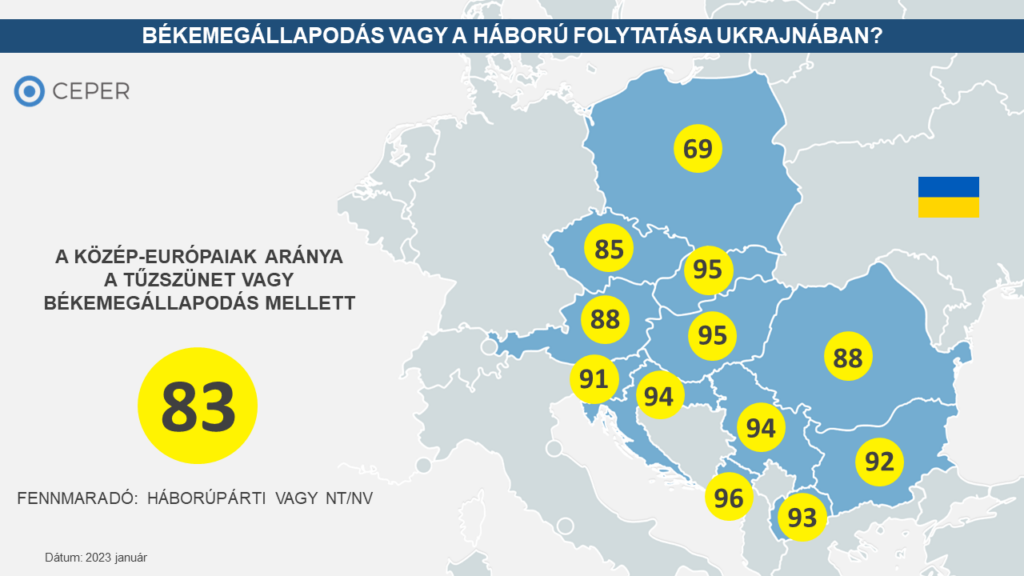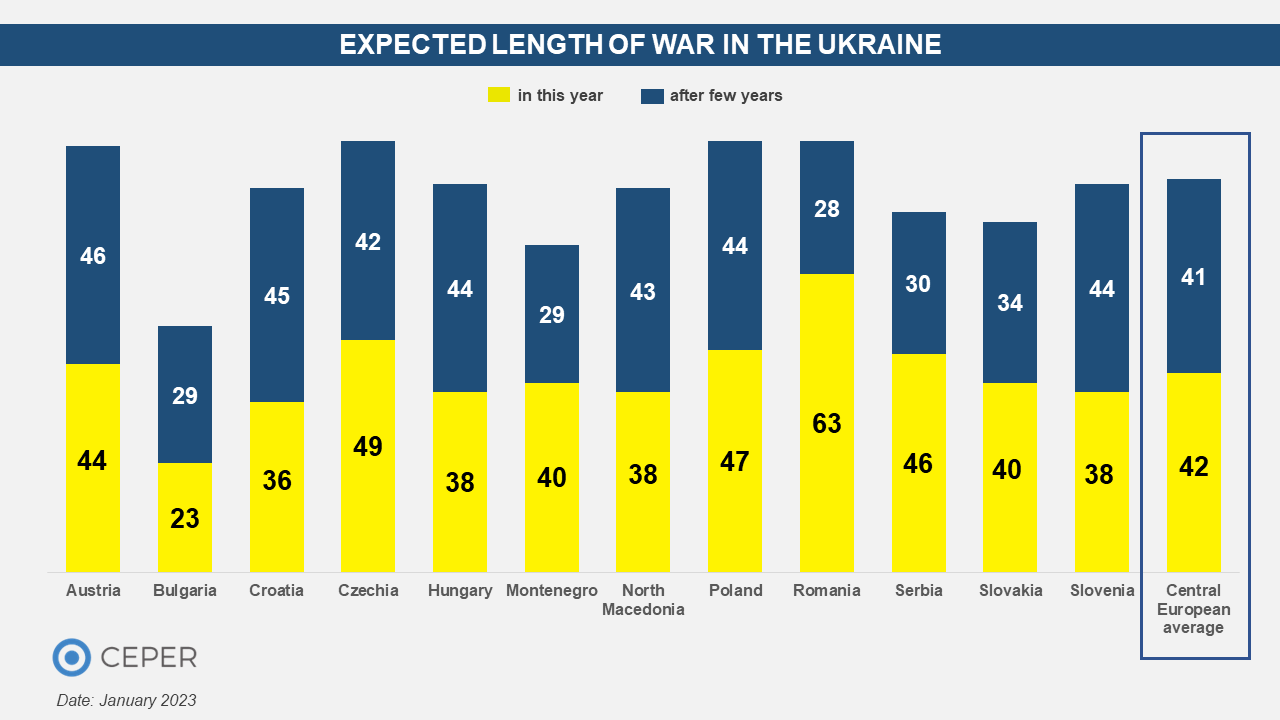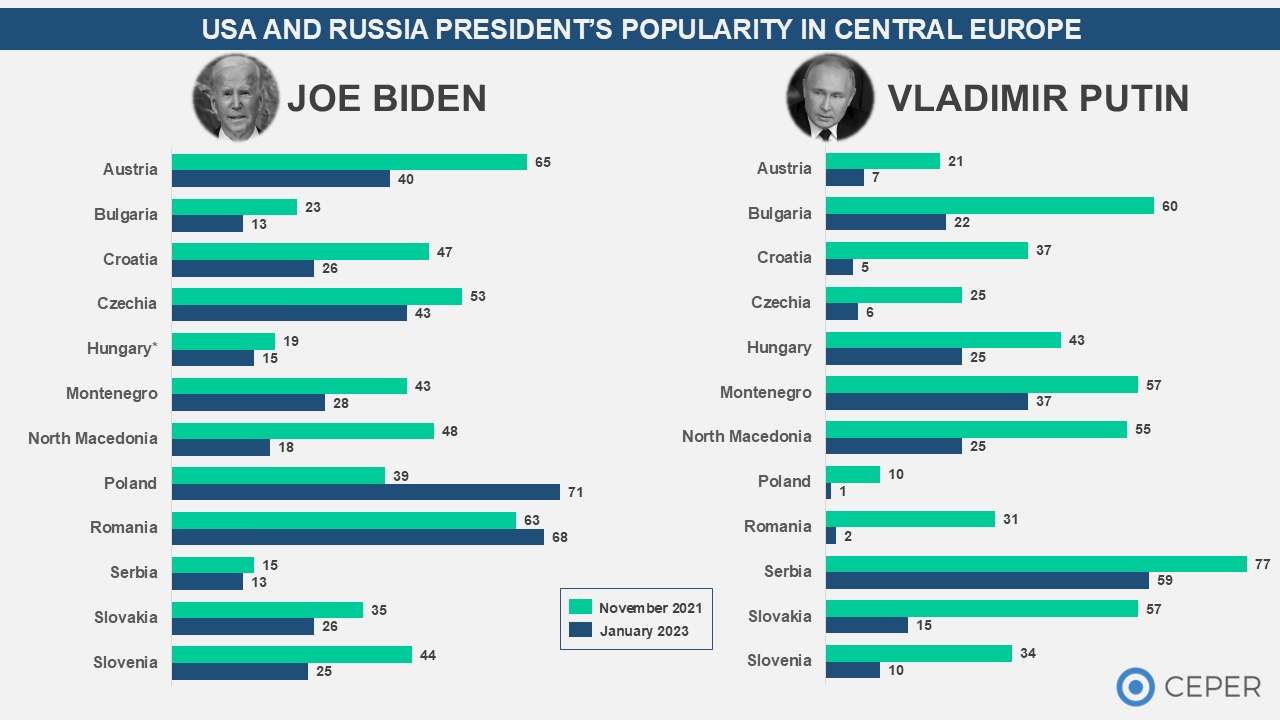83% in the region want ceasefire or peace agreement in Ukraine
Russia's war against Ukraine has been going on for almost a year, with at least 100,000 casualties on both sides. All Western countries are united in condemning Russia's aggression, but they have different opinions on how to handle the conflict.
The growing exhaustion from the war, which has already been going on for a year, is increasing the anxiety among European leaders. Even in the Central European countries neighbouring or close to Ukraine, the overwhelming majority of the population want ceasefire or peace, and not the continuation of the war. In the twelve Central European states surveyed in January 2023, 25% of respondents were in favour of a ceasefire, 58% were in favour of peace, and only 9% were in favour of the continuation of the war.

Pro-peace views are in absolute majority in almost all countries in the region. Only in Croatia (49%) and Poland (47%) were slightly fewer people in favour of peace, but even in these countries it is by far the most popular scenario. However, the devil is in the details, since both the Ukrainian and Russian leaders have already called for peace in their official statements, but both with conditions that are clearly unacceptable to the other side. Therefore, a mutual ceasefire agreement seems to be a more realistic scenario, which is favoured by 45% of Croats, 35% of Serbs and 34% of Czechs.
Montenegrins, Hungarians and Slovaks are the most united in their support for a ceasefire and a peace agreement, with more than 95% in favour of ending the armed conflict. Poles are the most sceptical about the possibility of a ceasefire, but still more than two thirds (69%) want the war to end. However, support for continuing the war is also the highest in Poland, the largest state in Central Europe. One in six respondents (17%) would prefer the war to continue in the hope of a Ukrainian victory.
The same number of people are confident that the war will end this year as are not
Despite the overwhelming majority of Central Europeans' desire for peace, they are much less confident that their wish will be fulfilled. It is probably clear to everyone that it is very difficult to define the conditions for a ceasefire or peace agreement that would be acceptable to both Ukraine and Russia.

This is why only 3% of the population of the twelve Central European countries are confident that the war will end next month and 39% are expecting that the war will end this year (42% in total). The same number of people think that the war will drag on: 41% of Central Europeans believe that it could take years to end.
At first glance, among the countries in the region, Bulgaria appears to be the most sceptical about the chances of a quick peace agreement (only 23.5% of Bulgarians believe that the war will end this year), but at the same time, almost half of them could not even give an answer to the question. Citizens of other countries were more willing to give their opinion on the issue. Croats (35.5%), Hungarians (38%) and Poles (38.5%) were the least confident that some form of an end to the war could be reached this year. Only the majority of Serbs (62%) and Montenegrins (51%) thought it might happen this year
It is not surprising that citizens are looking for those responsible for the wide gap between the desire for peace and the real chances of achieving it, which is also reflected in the Central European popularity indicators of Russian President Putin and US President Biden.
Vladimir Putin’s popularity
The Russian president who launched the war against Ukraine has become an extremely rejected politician in Central Europe. In November 2021, 77% of Serbs, 60% of Bulgarians and 57% of Slovaks had a "rather positive" opinion of Vladimir Putin, but the region as a whole did not support the Russian president even then. Only 10% of Poles, 21% of Austrians and 31% of Romanians had a positive opinion of him.
After a year of Russia's attack on Ukraine, the situation has changed significantly. While 59% of traditionally pro-Russian Serbs still have a positive opinion of Putin, his popularity has declined sharply in all other countries in the region. Only 1% of Poles, 2% of Romanians, 5% of Croats, 6% of Czechs and 7% of Austrians have a positive opinion of him. These countries also have the highest disapproval rates, hovering above 85%. In Hungary (60%), Bulgaria (62%) and Slovakia (71%), there is also a clear majority of those who have a negative opinion of the Russian president. This represents, in just over a year, a roughly doubling of disapproval in these countries.

Joe Biden’s popularity
At the same time, not only has the popularity of President Putin, the aggressor of the war, decreased in the Central European region since the end of 2021, but US President Biden has also lost support in all but two of the twelve countries surveyed. Unsurprisingly, the confidence of Poles and Romanians in Biden has increased: from 39 to 71% in Poland and from 63 to 68% in Romania. In the remaining countries, however, the US president has also lost popularity. While 65% of Austrians had a good opinion of the US president at the end of 2021, by the beginning of 2023 only 40% supported him. In Bulgaria, Slovakia and the Czech Republic, his popularity also fell by 10-10 percentage points.
While in Austria the pro- and anti-Biden camps are neck and neck, in Poland and Romania the supporters of the US president are in an absolute majority, and in the Czech Republic they are in a relative majority. In the remaining countries, those who distrust Biden are in the majority: 67% of Bulgarians, 61% of Slovenians, 60% of Hungarians and 59% of Slovaks have a rather negative opinion of the US president. At the end of 2021, the disapproval level of Biden was below 50% in all countries.
Methodology
The opinion-poll survey was carried out in 12 countries in the Central European region: Austria, Bulgaria, Croatia, Czech Republic, Hungary, Montenegro, Northern Macedonia, Poland, Romania, Serbia, Slovakia, Slovenia and Poland. The data were collected between 27 October and 26 November 2021 and between 9 and 26 January 2023. The survey was conducted by telephone (in person for Serbia and Montenegro) with 1000 respondents per country. The sample per country is representative by gender, age and type of settlement.
